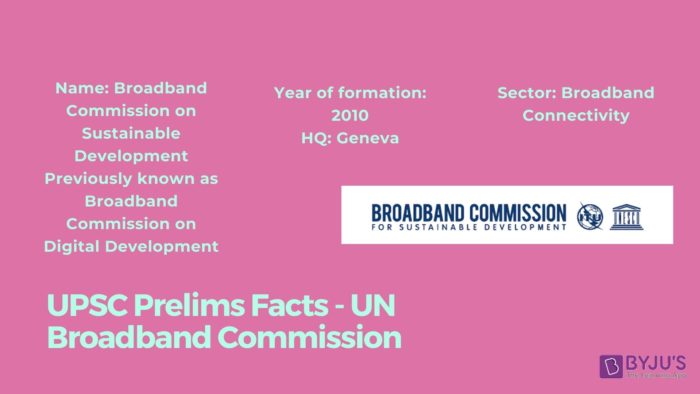The United Nations Broadband Commission for Sustainable Development is a UN commission established to promote internet access, especially broadband networks, to help in the pursuit of sustainable development goals. This is an important topic as the mission of the organisation finds resonance in India’s Digital India Mission. In this article, you can read all about the Broadband Commission for the UPSC exam.
UN Broadband Commission for Sustainable Development:- Download PDF Here

Broadband Commission for Sustainable Development
The Commission was formed in 2010 by UNESCO and the International Telecommunication Union (ITU).
- The commission was first named the UN Broadband Commission on Digital Development.
- It was set up as a step to achieve the Millennium Development Goals (MDGs).
- In 2015, when the SDGs were adopted by the United Nations, the commission was renamed to its current name.
- Members of the commission include policymakers, government representatives, academia and other organisations associated with internet connectivity.
- It aims at boosting the importance of broadband on the international policy agenda and expanding access to broadband in each and every country as a key for accelerating progress towards national as well as international targets for development.
- To pursue its goal of promoting broadband in developing and underdeveloped nations, the commission undertakes high-level diplomacy.
- One of the chief functions of the Broadband Commission is to champion for higher priority to be accorded to developing broadband services and infrastructure, to ensure that the technology’s benefits are enjoyed in all countries of the world.
- The commission’s secretariat is in ITU, Geneva.
To know more about Important Headquarters of International Organizations, check the linked article.
Aspirants would find the article very helpful in preparation for UPSC examination.
| Candidates can enhance their UPSC exam preparation by attempting UPSC Previous Years Question Papers now!!
To complement your preparation for the upcoming exam, check the following links: |
‘State of Broadband’ Report
The Commission brings out the ‘State of Broadband’ Report annually in which a snapshot of the international broadband industry is provided.
State of Broadband Report 2019 – Highlights
- There is a slowdown in overall internet adoption. Growth in households with internet access at home was flat between 2018 and 2017 (growing at 8.9% over the previous year).
- The price of bandwidth is decreasing. The international internet bandwidth prices for IP transit have dropped an average of 27% (CAGR) from 2015 to 2018.
- The online user base is growing.
- Investment is rising in emerging markets.
- The information and communications network has been growing. This includes fibre, mobile, satellite and undersea cables.
- The number of cybersecurity breaches and cyber-attacks continues to increase. The overall trust in emerging technologies is only 50%.
- There is a gender divide in internet usage particularly in countries where mobile adoption is the lowest. Even in North America, the percentage of women in computing jobs is declining.
To get a list of international organizations and their reports published, click on the linked article.
Candidates should go through the related links provided below to do preparation for UPSC exam even better-
Broadband Commission for Sustainable Development 2025 Goals
The Commission has set the following targets for Sustainable Development to be achieved by the year 2025:
| Sr No | 2025 Goals |
| 1 | A well-funded broadband plan/strategy should be available in all the countries. Else, broadband in their universal access and services definition should be included. |
| 2 | Developing countries should have entry-level broadband services at affordable rates priced at approx. 2% of their monthly gross national per capita income. |
| 3 | Deeper penetration of broadband internet users:
● 75% worldwide ● 65% in developing countries ● 35% in the least developing countries |
| 4 | A minimum level of proficiency in sustainable development digital skills should be achieved in 60% of adults and youth population |
| 5 | Usage of digital financial services amongst the world population should increase to 40%. |
| 6 | 50% reduction in the unconnectedness amongst the enterprises of Micro, Mini and Medium size sectors. |
| 7 | Achieving Gender Equality across all targets. |
UN Broadband Commission for Sustainable Development:- Download PDF Here

Comments